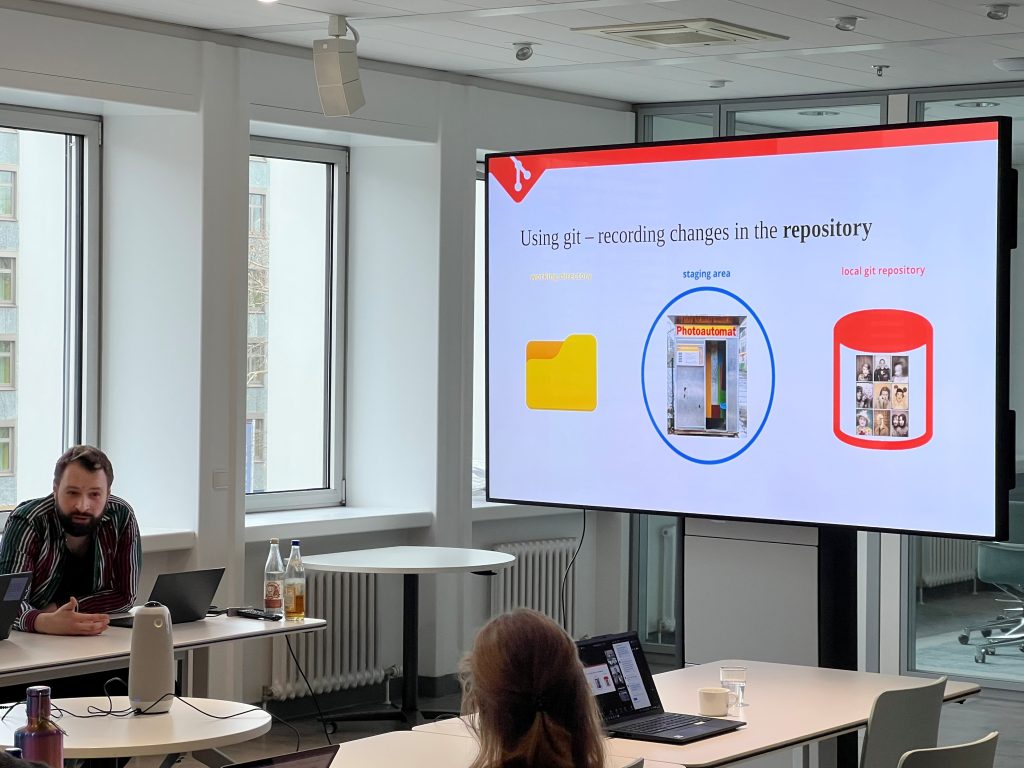On February 6th, 2025, LK Seiling facilitated a workshop for an Introduction to Git, with support from Sascha Kostadinoski and Quentin Bukold. This was co-organized by the Methods Lab and took place at the Weizenbaum institute. The hybrid event provided a thorough overview on the foundation of Git and its relative platforms for about 30 participants.
Firstly, Git was introduced for its general relevance. Seiling explored the qualities of its version control system and the advantages of efficiently managing changes to files. Its widespread use and accessibility were also highlighted by the software’s free and open source application. At its core, Git enables collaborative work by allowing concurrent adjustments to files by multiple participants and offers a system to track the changes made without requiring alterations to the original file.
Next, participants were invited to open the Terminal and guided through some basic commands. To this end, commands for traversing directories, creating, moving, organizing, and deleting files were explained and demonstrated in detail.

In the second hour of the workshop, Seiling encouraged participants to implement these basics by imagining the context of a classic Python project, one that might require collaborative engagement. Here, Python scripts were saved, renamed and staged accordingly to git messages and configurations. The principle git practices were emphasized to remind the audience of when and how to commit changes to the previously specified local repository. Furthermore, Seiling prepared guests to make requests when merging work, added description templates for joint projects and generally taught the features of use for group collaboration.
This was followed by instructions on the key functionality of Git, such as the Git repository, Git commands, branches, and conflict resolution. For instance, the branches gave insight into how to leverage simultaneous work done separately from the overall code base. This is especially beneficial for feature development while also helping to streamline the process of reviewing changes before merging. Throughout this instruction, commands were given to switch branches and merge scripts in the terminal, which was operationalized with a quickly constructed example. Seiling also provided necessary information on managing repositories, including visuals of the basic workflow and linkage between local and remote repositories, either for individual or collaborative effort.
For those curious when to use which Git platform, Bukold jumped in to detail the major differences between Github, Gitlab and Git.
Later, Seiling explored some advantageous elements of the GitLab platform, accessible free of charge to Weizenbaum researchers, by describing the repository graph, issue tracking and project management tools. To elaborate, the repository graph structures insight into how a participant makes a contribution or change by arranging branches to show merges or commits, particularly relevant for collaborative code projects. In case of software malfunctioning, the issue tracking feature allows one to see who is working on what branch for an update on the progress of the problem. Finally, Gitlab’s management tool was outlined for instances of assigning work, applying tags to notify when projects are finished and to open or close potential issues.
To close, Kostadinoski briefly summarized the basic elements of Git, along with its implications in data work, such as for software development and research. He simplified key terms and embraced questions in a Q&A. Seiling joined in, encouraging participants to “learn by doing” and stay connected with each other via Weizenbaum associated Github accounts for future internal coordination.
Throughout this workshop, participants were presented with various tasks and benefited from frequent recaps that highlighted key points, ensuring a solid understanding of the material. Attendees both online and in person freely asked questions and received support from instructors. Therefore the Methods Lab would like to give a huge thank you to LK Seiling, Sascha Kostadinoski and Quentin Bukold for their clear instruction on the foundations of Git and for facilitating such an engaging environment for all participants.